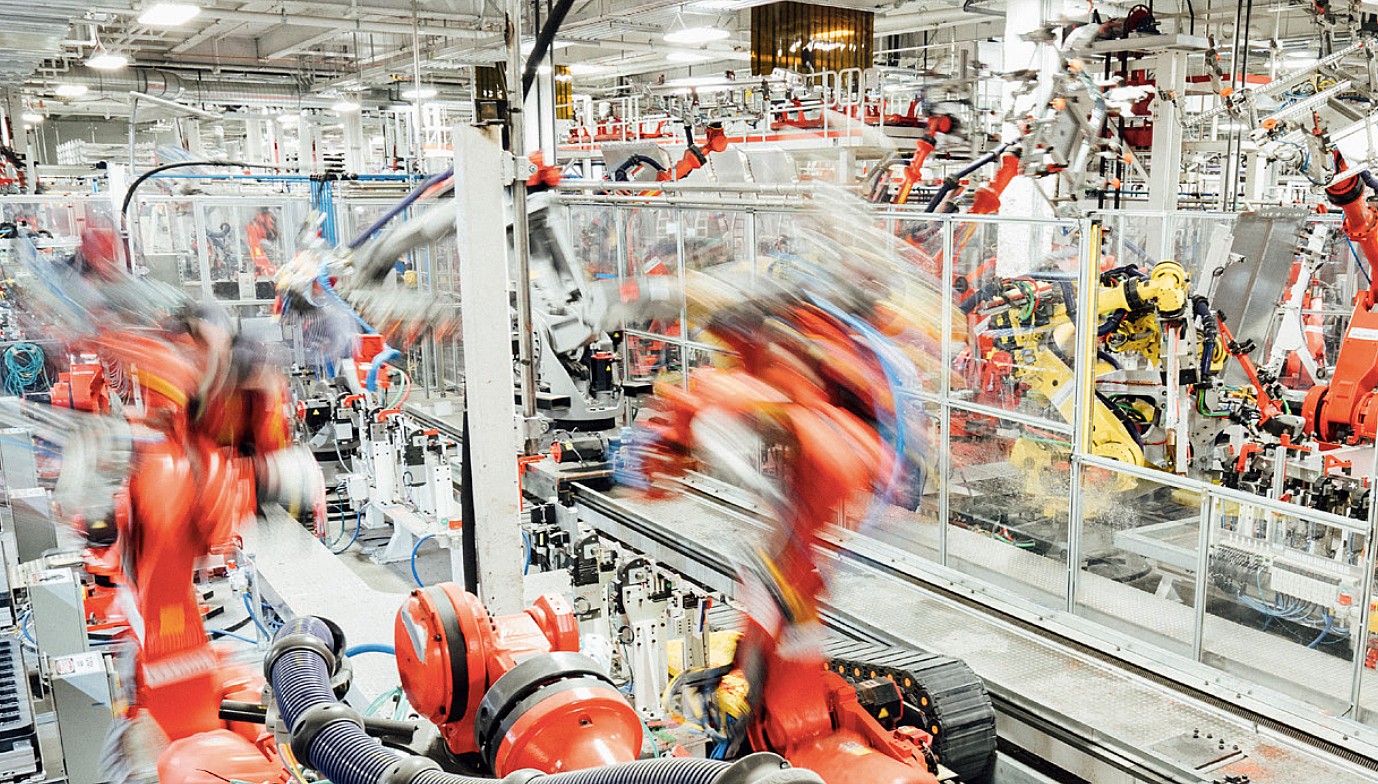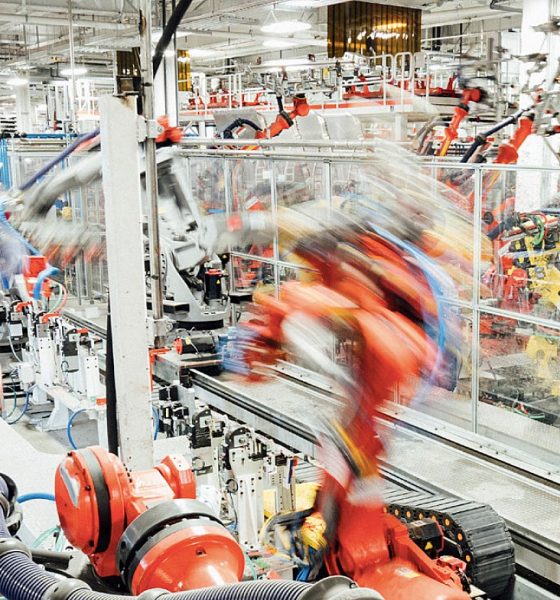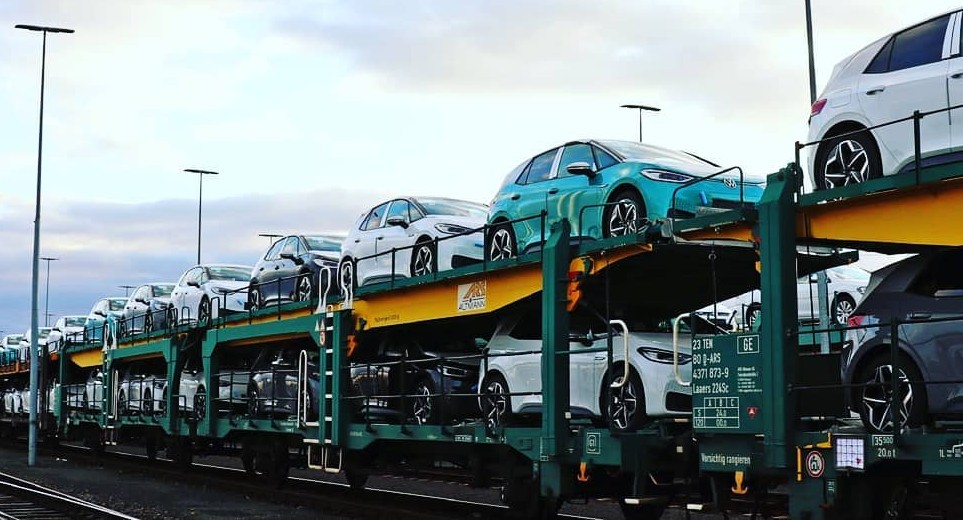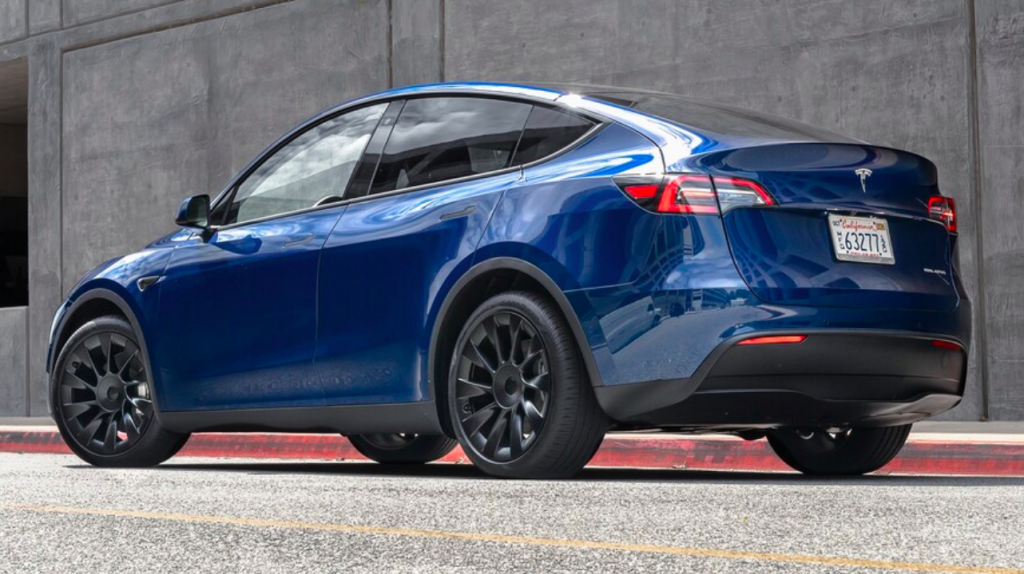

News
Tesla’s rivals from legacy auto are facing a day of reckoning due to the pandemic
In Volkswagen’s Zwickau plant in Germany, a storm seems to be brewing. The veteran automaker has put a lot of its cards on the ID.3, its upcoming all-electric hatchback. But with the pandemic still maintaining its hold on the global automotive market, things are starting to look a lot more challenging.
Volkswagen initially planned to produce the ID.3 en masse at the expansive facility. The Zwickau plant is expected to be one of the largest electric car factories in the globe, and it is poised to be a key factor in the German automaker’s attempt at closing the gap between itself and electric vehicle pioneer Tesla. Unfortunately for Volkswagen, the pandemic has thrown a proverbial wrench at its plans.
The effects of the COVID-19 virus will be felt for years to come, and the automotive sector will be among those that will likely take a massive hit. With the economic pressures of the pandemic, car buyers are expected to be more conservative about big ticket purchases. This could prove challenging for veteran automakers and their respective EV programs, as their electric lineup will likely hold a premium price over their more affordable gas-powered cars.

A premium price for electric vehicles will likely be a weight that legacy automakers would have to bear. With dropping oil prices, internal combustion cars could become more attractive to budget-conscious buyers. Tesla is pretty much immune to this, since the company only produces all-electric vehicles, and its cars are only getting more affordable. This was highlighted by the company’s recent decision to drop the price of its Model S, Model 3, and Model X, as well as its release of the Model Y.
In a recent statement to Bloomberg, Volkswagen has stated that when it comes to its shift to electric vehicles, the company has simply reached a point where there is no turning back. The pandemic has pretty much crushed demand for vehicles, and all-electric cars like the ID.3 are poised to enter uncharted territory. This was addressed by Thomas Ulbrich, who runs Volkswagen’s EV business. In a statement, he noted that ultimately, “we all have a historic task to accomplish to protect the health of our employees—and at the same time get business back on track responsibly.”
For VW, this means that the company has to push through with the ID.3 regardless of the existing challenges in the market. CEO Herbert Diess, an avid supporter of the electric car movement who has earned the respect of Tesla’s Elon Musk, hinted at this in previous comments. In a post last month on LinkedIn, Diess stated that he and his colleagues are still hard at work with the ID.3. “My new working week starts together with Thomas Ulbrich at the wheel of a Volkswagen ID.3 – our most important project to meet the European CO2-targets in 2020 and 2021. We are fighting hard to keep our timeline for the launches to come,” the CEO wrote.

Prior to the onset of the coronavirus, Volkswagen was poised to push the ID.3 as the first of its flagship electric vehicle line. But with the pandemic, things are poised for some big changes. The German automaker has already started adapting to these coming changes, and some seem to be partly inspired by younger carmakers such as Tesla. The company, for example, has decided to offer its ID.3 line online. Volkswagen has also started rolling out touchless test drives, just like Tesla in the United States and China.
But things will not be easy. The global automotive market will take a hit this year because of the pandemic, and some companies may end up in dire straits. French finance minister Bruno Le Maire has stated that Renault SA, the maker of the popular Zoe electric car, can “disappear” without state aid. Even Toyota, a company that is largely considered as an immovable pillar in the automotive segment, has warned that its profits will likely tumble to the lowest level in almost a decade.
For now, the best bet for automakers planning on releasing electric cars would be to release vehicles that provide what car buyers in the post pandemic would prefer: value and practicality. Tesla’s bet for this lies in the Model Y and the Model 3, as both cars are reasonably priced and offer the best that the EV industry has to offer. Hopefully, automakers like Volkswagen would be able to accomplish the same.

News
Tesla wins another award critics will absolutely despise
Tesla earned an overall score of 49 percent, up 6 percentage points from the previous year, widening its lead over second-place Ford (45 percent, up 2 points) to a commanding 4-percentage-point gap. The company also excelled in the Fossil Free & Environment category with a 50 percent score, reflecting strong progress in reducing emissions and decarbonizing operations.

Tesla just won another award that critics will absolutely despise, as it has been recognized once again as the company with the most sustainable supply chain.
Tesla has once again proven its critics wrong, securing the number one spot on the 2026 Lead the Charge Auto Supply Chain Leaderboard for the second consecutive year, Lead the Charge rankings show.
NEWS: Tesla ranked 1st on supply chain sustainability in the 2026 Lead the Charge auto/EV supply chain scorecard.
“@Tesla remains the top performing automaker of the Leaderboard for the second year running, and increased its overall score by 6 percentage points, while Ford only… pic.twitter.com/nAgGOIrGFS
— Sawyer Merritt (@SawyerMerritt) March 4, 2026
This independent ranking, produced by a coalition of environmental, human rights, and investor groups including the Sierra Club, Transport & Environment, and others, evaluates 18 major automakers on their efforts to build equitable, sustainable, and fossil-free supply chains for electric vehicles.
Tesla earned an overall score of 49 percent, up 6 percentage points from the previous year, widening its lead over second-place Ford (45 percent, up 2 points) to a commanding 4-percentage-point gap. The company also excelled in the Fossil Free & Environment category with a 50 percent score, reflecting strong progress in reducing emissions and decarbonizing operations.
Perhaps the most impressive achievement came in the batteries subsection, where Tesla posted a massive +20-point jump to reach 51 percent, becoming the first automaker ever to surpass 50 percent in this critical area.
Tesla achieved this milestone through transparency, fully disclosing Scope 3 emissions breakdowns for battery cell production and key materials like lithium, nickel, cobalt, and graphite.
The company also requires suppliers to conduct due diligence aligned with OECD guidelines on responsible sourcing, which it has mentioned in past Impact Reports.
While Tesla leads comfortably in climate and environmental performance, it scores 48 percent in human rights and responsible sourcing, slightly behind Ford’s 49 percent.
The company made notable gains in workers’ rights remedies, but has room to improve on issues like Indigenous Peoples’ rights.
Overall, the leaderboard highlights that a core group of leaders, Tesla, Ford, Volvo, Mercedes, and Volkswagen, are advancing twice as fast as their peers, proving that cleaner, more ethical EV supply chains are not just possible but already underway.
For Tesla detractors who claim EVs aren’t truly green or that the company cuts corners, this recognition from sustainability-focused NGOs delivers a powerful rebuttal.
Tesla’s vertical integration, direct supplier contracts, low-carbon material agreements (like its North American aluminum deal with emissions under 2kg CO₂e per kg), and raw materials reporting continue to set the industry standard.
As the world races toward electrification, Tesla isn’t just building cars; it’s building a more responsible future.
News
Tesla Full Self-Driving likely to expand to yet another Asian country
“We are aiming for implementation in 2026. [We are] doing everything in our power [to achieve this],” Richi Hashimoto, president of Tesla’s Japanese subsidiary, said.

Tesla Full Self-Driving is likely to expand to yet another Asian country, as one country seems primed for the suite to head to it for the first time.
The launch of Full Self-Driving in yet another country this year would be a major breakthrough for Tesla as it continues to expand the driver-assistance program across the world. Bureaucratic red tape has held up a lot of its efforts, but things are looking up in some regions.
Tesla is poised to transform Japan’s roads with Full Self-Driving (FSD) technology by 2026.
Richi Hashimoto, president of Tesla’s Japanese subsidiary, announced the ambitious timeline, building on successful employee test drives that began in 2025 and earned positive media reviews. Test drives, initially limited to the Model 3 since August 2025, expanded to the Model Y on March 5.
Once regulators approve, Over-the-Air (OTA) software updates could activate FSD across roughly 40,000 Teslas already on Japanese roads. Japan’s orderly traffic and strict safety culture make it an ideal testing ground for autonomous driving.
Hashimoto said:
“We are aiming for implementation in 2026. [We are] doing everything in our power [to achieve this].”
The push aligns with Hashimoto’s leadership, which has been credited for Tesla’s sales turnaround.
In 2025, Tesla delivered a record 10,600 vehicles in Japan — a nearly 90% jump from the prior year and the first time exceeding 10,000 units annually.
BREAKING 🇯🇵 FSD IS LIKELY LAUNCHING IN JAPAN IN 2026 🚨
Richi Hashimoto, President of Tesla’s Japanese subsidiary, stated: “We are aiming for implementation in 2026” and added that they are “doing everything in our power” to achieve this 🔥
Test drives in Japan began in August… pic.twitter.com/jkkrJLszXN
— Ming (@tslaming) March 5, 2026
The strategy shifted from online-only sales to adding 29 physical showrooms in high-traffic malls, plus staff training and attractive financing offers launched in January 2026. Tesla also plans to expand its Supercharger network to over 1,000 points by 2027, boosting accessibility.
This Japanese momentum reflects Tesla’s broader international expansion. In Europe, Giga Berlin produced more than 200,000 vehicles in 2025 despite a temporary halt, supplying over 30 markets with plans for sequential production growth in 2026 and battery cell manufacturing by 2027.
While regional EV sales faced headwinds, the factory remains a cornerstone for Model Y deliveries across the continent.
In Asia, Giga Shanghai continues to be recognized as Tesla’s powerhouse. China, the company’s largest market, saw January 2026 deliveries from the plant rise 9 percent year-over-year to 69,129 units, with affordable new models expected later this year.
FSD advancements, already progressing in the U.S. and South Korea, are slated for Europe and further Asian rollout, complementing plans to expand Cybercab and Optimus to new markets as well.
With OTA-enabled autonomy on the horizon and retail strategies paying dividends, Tesla is strengthening its footprint from Tokyo showrooms to Berlin assembly lines and Shanghai exports. As Hashimoto continues to push Tesla forward in Japan, the company’s global vision for sustainable, self-driving mobility gains traction across Europe and Asia.
News
Tesla ships out update that brings massive change to two big features
“This change only updates the name of certain features and text in your vehicle,” the company wrote in Release Notes for the update, “and does not change the way your features behave.”

Tesla has shipped out an update for its vehicles that was caused specifically by a California lawsuit that threatened the company’s ability to sell cars because of how it named its driver assistance suite.
Tesla shipped out Software Update 2026.2.9 starting last week; we received it already, and it only brings a few minor changes, mostly related to how things are referenced.
“This change only updates the name of certain features and text in your vehicle,” the company wrote in Release Notes for the update, “and does not change the way your features behave.”
The following changes came to Tesla vehicles in the update:
- Navigate on Autopilot has now been renamed to Navigate on Autosteer
- FSD Computer has been renamed to AI Computer
Tesla faced a 30-day sales suspension in California after the state’s Department of Motor Vehicles stated the company had to come into compliance regarding the marketing of its automated driving features.
The agency confirmed on February 18 that it had taken a “corrective action” to resolve the issue. That corrective action was renaming certain parts of its ADAS.
Tesla discontinued its standalone Autopilot offering in January and ramped up the marketing of Full Self-Driving Supervised. Tesla had said on X that the issue with naming “was a ‘consumer protection’ order about the use of the term ‘Autopilot’ in a case where not one single customer came forward to say there’s a problem.”
This was a “consumer protection” order about the use of the term “Autopilot” in a case where not one single customer came forward to say there’s a problem.
Sales in California will continue uninterrupted.
— Tesla North America (@tesla_na) December 17, 2025
It is now compliant with the wishes of the California DMV, and we’re all dealing with it now.
This was the first primary dispute over the terminology of Full Self-Driving, but it has undergone some scrutiny at the federal level, as some government officials have claimed the suite has “deceptive” names. Previous Transportation Secretary Pete Buttigieg was one of those federal-level employees who had an issue with the names “Autopilot” and “Full Self-Driving.”
Tesla sued the California DMV over the ruling last week.








